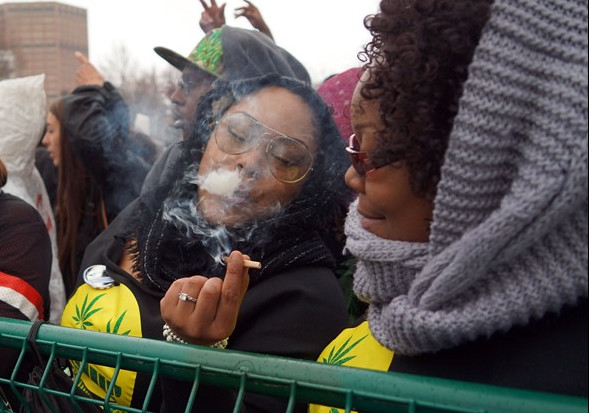“Just say no.”
When, as a high schooler, I heard Nancy Reagan’s simplistic, national anti-drug mantra, I immediately questioned it. (What? Why?)
Filmmaker Windy Borman heard it as the imperative intended: don’t fry your brain like an egg. In MARY JANES: THE WOMEN OF WEED, Ms. Borman, now all grown up, challenges why she listened and whether she should join America’s burgeoning pot party, never having partaken herself.
Almost immediately in this solid feature documentary, Ms. Borman discounts the myth of marijuana as a gateway drug despite the government’s stance that it should remain a Schedule I substance along with heroin, peyote, ecstasy and LSD. However, under the broader umbrella of Cannabis, it can serve as a gateway to examine harder issues: Gender Parity, Social Justice and Environmental Sustainability. Of course, this is a lot to tackle in 85 minutes, but the movie shuffles along at a reasonable clip, topic to topic, talking head to talking head.
Gender parity is the easiest point to prove: women hold 36% of the leadership positions in the industry versus the national average of 22% for other fields. While this is an inarguable statistical improvement, what impact those numbers have is foggier. As Ms. Borman interviews women in the canna-business almost exclusively, the consequence of this E-suite anomaly is difficult to contextualize beyond the anecdotal. The filmmaker’s latent theory, gently presented and mildly persuasive, is that because more women are in charge, there is a greater sensitivity to matters above and beyond the bottom line.
Okay, could be. Certainly, we are introduced to forty ganjapreneurs whose hearts are in the right place and whose values align with many larger social movements from #MeToo to #BlackLivesMatter. We hear from female farmers and scientists who champion an agricultural preference for this cash crop and an enthusiasm for its medicinal benefits. Even Melissa Etheridge provides testimonial for how medical marijuana has staved off the pain and bodily indignities of cancer. Two-thirds of the way through the film, it’s not just Melissa singing praises, it’s as if the whole audience will begin to harmonize — or perhaps that was just the choir with whom I attended a special screening of MARY JANES. Ms. Borman calls converts Puffragettes. But… Will she get down?
In the last third of the movie, the narrative shifts to Ms. Borman’s own decision-making process: to toke or not to toke. It’s a jarring choice and, not necessarily a compelling one. On the plus side, there are many like Ms. Borman who have been inhibited abut inhaling and, perhaps, seeing the director overcome her own hesitation will prove cathartic or motivational. That said, her journey feels a bit precious.

Credit: leafly.com
Rather than just smoke a joint, Ms. Borman utilizes a Volcano Vaporizer which, to my untrained eye, looks as goofy as it does intimidating. And it’s not something most people will ever even see much less use—the price of a Volcano hovers around $700. I don’t begrudge Ms. Borman for her choices, but in a documentary that aims to break down barriers, her upper-middle-class half-stepping undercuts her efforts. (Editor’s note: “Intimidating” is a fair description from the author, a non-cannabis guy, but we stand by the Volcano as a game-changing cannabis accessory.)
Like Nancy Reagan’s campaign decades earlier, Windy Borman presents a rebuttal that works best if left unquestioned. Just say No versus just say Yes. MARY JANES proves there is opportunity for change through the Cannabis industry, in terms of politics, both global and personal. Thus the uninitiated might… Just ask why. Or better yet, Why not?
Credit: leafly.com













